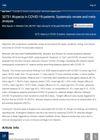 77 citations,
March 2004 in “Human Reproduction”
77 citations,
March 2004 in “Human Reproduction” Women with irregular periods and/or excessive body hair are more likely to have polycystic ovaries, and this condition is linked to higher health risks.
 29 citations,
March 2021 in “Frontiers in Endocrinology”
29 citations,
March 2021 in “Frontiers in Endocrinology” Testosterone may influence COVID-19 severity and outcomes.
 February 2024 in “Journal of Robotic Surgery”
February 2024 in “Journal of Robotic Surgery” The document concludes that surgical robots improve surgery and recovery but are costly and can stress surgeons due to less patient contact.
 15 citations,
September 2021 in “Frontiers in Endocrinology”
15 citations,
September 2021 in “Frontiers in Endocrinology” Hormone therapy increases the risk of heart-related issues in transgender women and may affect heart health in transgender men.
 6 citations,
May 2021 in “Clinical Chemistry and Laboratory Medicine”
6 citations,
May 2021 in “Clinical Chemistry and Laboratory Medicine” Different ACE2 gene versions may affect COVID-19 impact based on age and suggest some hair loss drugs could be potential treatments.
 3 citations,
July 2022 in “Indian journal of dermatology, venereology, and leprology”
3 citations,
July 2022 in “Indian journal of dermatology, venereology, and leprology” Patients with alopecia areata have higher oxidative stress and lower antioxidant levels.
 September 2022 in “Journal of The American Academy of Dermatology”
September 2022 in “Journal of The American Academy of Dermatology” Different types of hair loss are linked to COVID-19, with some types possibly increasing risk of getting the virus, while others may be triggered or worsened by the virus.
 January 2018 in “Figshare”
January 2018 in “Figshare” Horizontal sections of scalp biopsies are useful for telling the difference between Androgenetic Alopecia and Alopecia Areata.
29 citations,
May 2016 in “Journal of the American Academy of Dermatology” Patients with alopecia areata might have a lower risk of stroke and possibly heart attack.
23 citations,
November 2018 in “International Journal of Molecular Sciences” Deoxyshikonin helps wounds heal faster in diabetic mice.
19 citations,
July 2020 in “EBioMedicine” A gene variant increases the risk of a type of hair loss by affecting hair protein production.
15 citations,
August 2013 in “Gene” The MTHFR C677T mutation may increase the risk of alopecia areata in the Turkish population.
 12 citations,
September 2022 in “Foods”
12 citations,
September 2022 in “Foods” Some nutraceuticals may help in COVID-19 prevention and treatment, but more research is needed.
 4 citations,
April 2022 in “Dermatologic Therapy”
4 citations,
April 2022 in “Dermatologic Therapy” Injecting scalp tissue micrografts is a safe and effective treatment for hair loss after COVID-19.
 2 citations,
May 2021 in “Stem Cells International”
2 citations,
May 2021 in “Stem Cells International” Human pluripotent stem cells could be used to make platelets for medical use, but safety, effectiveness, and cost issues need to be resolved.
 1 citations,
April 2023 in “International Journal of Molecular Sciences”
1 citations,
April 2023 in “International Journal of Molecular Sciences” New CRISPR/Cas9 variants and nanotechnology-based delivery methods are improving cancer treatment, but choosing the best variant and overcoming certain limitations remain challenges.
1 citations,
January 2023 in “Journal of Obstetrics and Gynaecology” High DHEA and short cervical length in women with PCOS and recurrent miscarriages may harm pregnancy outcomes.
 1 citations,
December 2022 in “BMC Public Health”
1 citations,
December 2022 in “BMC Public Health” Long-term effects of COVID-19 can vary over time and are more likely in certain age and gender groups, while race, income, and education levels have little to no impact. Ongoing medical care is needed due to potential complications.
 August 2024 in “Current Protocols”
August 2024 in “Current Protocols” The C3H/HeJ mouse model is useful for studying and testing treatments for alopecia areata.
 October 2023 in “Medical records-international medical journal”
October 2023 in “Medical records-international medical journal” People with AB blood type may be more likely to get melasma.
 March 2023 in “The primary care companion for CNS disorders”
March 2023 in “The primary care companion for CNS disorders” Dengue fever can cause hair loss that may lead to serious psychological issues like Body Dysmorphic Disorder in young women.
 February 2023 in “Global journal of health sciences and research”
February 2023 in “Global journal of health sciences and research” Zinc levels are not significantly linked to the presence or severity of alopecia areata.
 January 2019 in “Srpski Arhiv Za Celokupno Lekarstvo”
January 2019 in “Srpski Arhiv Za Celokupno Lekarstvo” The technique improved hair transplant success and patient satisfaction by matching hair growth direction.
February 2009 in “Mayo Clinic proceedings” A woman's new seizures were caused by a brain tumor likely linked to her past cancer treatment, and choosing safe seizure medications is important for women who can have children.
November 2022 in “Journal of the Endocrine Society” Marijuana use may be linked to lower TSH levels, but the exact cause is unclear.
 74 citations,
January 2015 in “Asian Journal of Transfusion Science”
74 citations,
January 2015 in “Asian Journal of Transfusion Science” Platelet-rich plasma (PRP) injections can effectively increase hair density and thickness in people with androgenic alopecia, without major side effects.
55 citations,
November 2010 in “Journal of Allergy and Clinical Immunology” The L412F variant of TLR3 is linked to skin infections, more viral infections, and autoimmune issues.
53 citations,
July 2016 in “Cosmetics” Future hair cosmetics will be safer and more effective.
11 citations,
January 2018 in “IET Nanobiotechnology” The scaffolds significantly sped up wound healing in dogs and were safe.
10 citations,
March 2021 in “Annals of palliative medicine” PRP shows promise in healing but needs a standardized, safe preparation method.


















